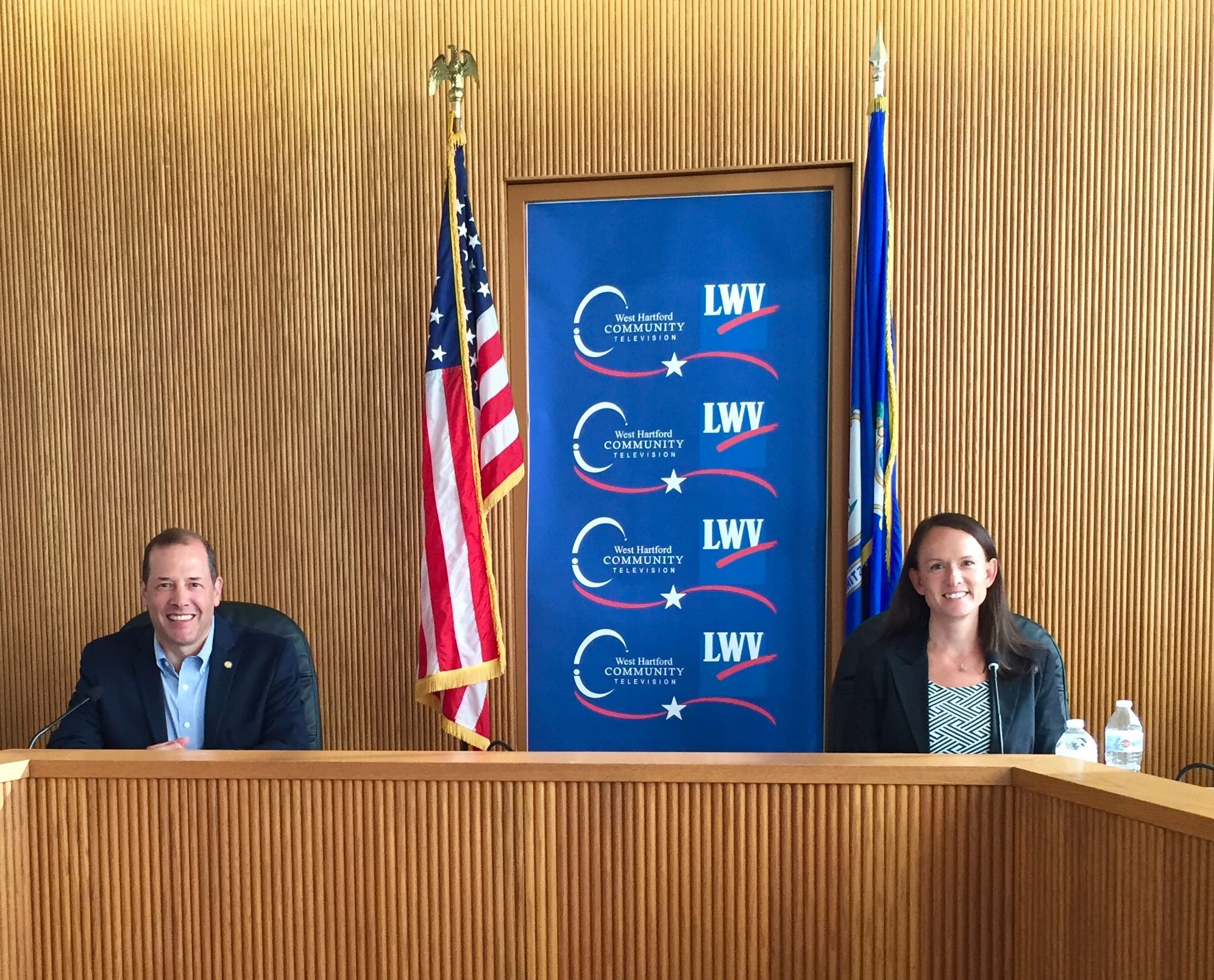18th District Democratic Candidates Debate Focuses on Experience vs. New Energy

Audio By Carbonatix

State Rep. Andy Fleischmann and challenger Jillian Gilchrest participated in the 18th Assembly District Democratic debate on Aug. 9, sponsored by the League of Women Voters and WHC-TV. Photo credit: Ronni Newton
The League of Women Voters of Greater Hartford, in conjunction with West Hartford Community Television, sponsored a debate between incumbent 18th District State Rep. Andy Fleischmann and Jillian Gilchrest who is challenging him in the Democratic primary.
By Ronni Newton
West Hartford Democrats who live in the 18th Assembly District will go to the polls on Aug. 14 to determine which candidate will be on the ticket in November, and incumbent Andy Fleischmann and challenger Jillian Gilchrest took the opportunity to share their platforms Thursday night in an hour-long debate sponsored by the League of Women Voters of Greater Hartford and West Hartford Community Television (WHC-TV).
There was no announced winner at the conclusion of the debate, and both candidates admitted that they are both progressives who agree on virtually all major issues. The major differentiator: Fleischmann has nearly 24 years of experience in the legislature and is chair of the House Education Committee, while Gilchrest pledges to bring new strategies and energy to the capitol.
In his opening statement, Fleischmann told the audience that he has been honored to serve as state representative and hopes to be the Democratic nominee. He touted his record and experience, and the legislation he supported to secure $3 million more in state funding for West Hartford despite the governor’s attempt to cut aid, as well measures to ban bump stocks and a bill to ensure pay equity.
“I believe there is a lot of work left to do,” Fleischmann said, noting that implementing paid family medical leave, encouraging job creation through additional incubator space and housing for workers, and protecting and increasing state support for West Hartford schools are among his priorities. “To win these these progressive victories, I need your help,” he said, asking for support in Tuesday’s primary and thanking Democrats for past support.
Gilchrest said she moved to West Hartford because she fell in love with the town – its parks and tree-lined streets, but most of all the people. “I have decided to run for state representative because I am worried for our community and our state,” she said.
The state budget has been, and continues to be, in trouble, Gilchrest said. “I think we need to elect leaders who are willing to take action.” She said that she has spent the last 15 years working on policy on behalf of nonprofits and wants to use that experience to champion social justice issues, and although Fleischmann also supports those issues, “what I mean by championing them is getting them passed into law,” Gilchrest said. She also said she would use her skills as a social worker “to really listen.”
The candidates responded to questions that the League posed about the Education Cost Sharing (ECS) formula, the environment, and healthcare coverage for pre-existing conditions, as well as to other questions submitted by the audience.
Gilchrest said that West Hartford has not been fully funded under the ECS formula since 1996, and instead of the continued tweaking it needs to be completely changed. A dedicated revenue source for public education must be established, along with a statewide system for properly funding special education.
Fleischmann said that recent changes to ECS, which he has championed, have benefited West Hartford. “The problem is that everyone comes to Hartford looking for change for their community,” he said. He said that he took the lead on turning back a proposal that would have hurt West Hartford and noted his support for a task force to look at a brand new model, a captive insurance company that could control ECS costs.
The candidates did not hesitate to take digs at each other.
Gilchrest said that Fleischmann has been in the legislature and has helped create the environment that won’t make wholesale change. “We need to stop and actually go back and revamp the entire budget,” she said.
Fleischmann said he finds it “ludicrous” that one person can think they can be responsible for creating that type of change, and whomever is in the legislature needs to actually put forth proposals. “More than words, it’s actual ideas.”
Fleischmann said he’s a “lifelong environmentalist” who has consistently received a stellar report card on environmental issues and fought for and won $10 million for clean energy programs in the last budget cycle.
Gilchrest said she is also an environmentalist, but is concerned that the energy efficiency fund has been raided because of the budget problems in the state. One solution she suggested that would good for the environment and create jobs is to “finally let Tesla into the state.” She said that Fleischmann, “says he supports things and then doesn’t get it passed across finish line.”
Gilchrest said that in her job as director of Health Professional Outreach at the Connecticut Coalition Against Domestic Violence she has worked with the state attorney general to protect essential benefits in healthcare. Many are concerned because so many things – like having had a child – can be considered pre-existing conditions.
Fleischmann, who is a cancer survivor, said he co-sponsored the legislation that Gilchrest mentioned, so that pre-existing conditions like cancer will not be excluded, and neonatal, maternity, and wellness care, as well as birth control, will remain covered in Connecticut. “We have taken important steps forward to protect ourselves and be a firewall against the craziness in Washington,” he said.
Gilchrest said that one of her jobs is to teach advocacy. She said that since the start of the election season Fleischmann has been “claiming to be a champion and fighter of so many bills,” but while signing a cosponsor form is important, “we need to elect lawmakers who fight” even when it’s not an election year.
Fleischmann said Gilchrest “isn’t omniscient,” and doesn’t know about the conversations he has had and support he has given to constituents who are suffering. He said it’s “important for those of us who are voting to look at the record,” and that he rejects Gilchrest’s “mischaracterization.”
Both said they are passionate in their support of paid family and medical leave. Gilchrest said she’s ready to push it through, while Fleischmann said that it’s necessary to work across the aisle because of the number of votes needed, something that he is equipped to do because of relationships he has built. He also said it’s important to elect more progressives because “someone who supports Trump and the Republican party line” is not going to support paid family and medical leave.
Both vehemently expressed their desire to ban ghost guns, but Gilchrest said that Fleischmann is “not engaged enough” and did not even co-sponsor a recent bill that died in committee. Fleischmann is calling for a special session of the legislature to vote ban ghost guns, while Gilchrest said the state can’t afford it.
In response to a question about the need to make improvements in sexual harassment laws in the era of “#metoo,” Gilchrest said that changes need to start with the legislature’s own procedures for reporting, where the only recourse is to complain to the chief of staff. Fleischmann said that’s not correct, and there is a list of 10 Democrats and 10 Republicans who can be approached if someone feels they are being harassed, but agreed that there should be more outlets.
Fleischmann noted his experience in working on a bipartisan effort to pass the budget. While he had many concerns about the budget passed in 2017, some were fixed in 2018, he said. Expecting a similar process in the next few years, Fleischmann said he’s positioned to do it again.
Gilchrest said the system needs to be completely revamped, and that the appropriations and finance committees should be involved from the beginning. “I don’t think we can continue the same process which is wait for the governor to put out the budget and then have appropriations respond.”
Gilchrest does not favor a higher tax for millionaires. She said she supports taxing online sales, and is in favor of tolls “which have been studied to death.”
Fleischmann said that other states around Connecticut have a higher marginal tax rate, and that’s something that should not be ignored.
The candidates were asked how their policy views differ, and Fleischmann said they don’t have major differences. “As someone serving in office, my job is to tell you what I’ve done and what I will continue to do,” he said. What’s important to effecting change is helping elect more progressive Democrats to the legislature.
Gilchrest said that while campaigning she knocked on 4,000 doors, and what people said is that they are concerned with taxes, the state budget, and what they perceive as inaction. She said the difference between the two candidates is more about the “way we lead … I’m going to engage you. That’s my passion as a social worker.”
Fleischmann countered that he has protected West Hartford well in a tough environment, and that’s not something a first-year legislator could do. Sustained effort, and protection for what we have won is what’s needed, he said.
The candidates were asked if they would support their opponent. Gilchrest said that was a tough question, but that she would “continue to support the Democratic party.” Fleischmann said he would “absolutely support my opponent if she prevails … it’s critically important that we hang together as a party.”
The single-most important issue in the 18th District, Gilchrest said, is the state budget. Fleischmann said it’s ensuring that local property taxes don’t get pushed up due to lack of state support.
In his closing remarks, Fleischmann said that those who share values need to work together to effect change, especially in the face of a national picture that jeopardizes democracy.
Gilchrest thanked Fleischmann for his years of public service, but said that after 23 years you get static, and it’s time for a change at the capitol.
The debate, before a live audience of about 100 that packed Town Council chambers. was moderated by Carole Mulready, chair of Voter Services and immediate past president of the League’s local chapter. In addition to the opening and closing statements, each candidate was permitted 20 minutes of total response time to questions which were posed by the league as well as submitted by audience members. WHC-TV also live-streamed the debate.
Connecticut’s primary will be held on Tuesday, Aug. 14. Polls will be open from 6 a.m. until 8 p.m. Only registered Republicans and registered Democrats are eligible to vote in their party’s primaries. More specific information about voting in West Hartford is available here on the town’s website.
The winner of the 18th District primary will face Republican Mary Fay in November.
Fay attended the debate and said afterward that she likes both candidates personally and didn’t feel that they differentiated themselves. One has 23 years of experience and the other is a new face, she said, “but essentially they’re very philosophically in party lines.” Regardless of who her opponent is, Fay said that her approach as a Republican is different, and that while she supports the same social issues as both Democrats, her major focus is on fiscal reform.
Like what you see here? Click here to subscribe to We-Ha’s newsletter so you’ll always be in the know about what’s happening in West Hartford!




Why are photo credits obscuring Gilchrest’s face, allowing Fleischmann to stand-out? 1000 words?
Hi Teri, That’s completely unintentional and only appears that way on mobile. If you read the story on a desktop, the caption only covers the wood. Jillian Gilchrest happened to be sitting on the right, and that’s where the caption appears. ~Ronni
[…] Gilchrest said she is already prepared to respond to major issues that will be a focus of the upcoming election. “First and foremost we have to look at how to address Connecticut’s budget deficit,” said Gilchrest. […]